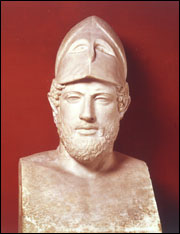Pericles
 From Conservapedia
From Conservapedia Pericles (Greek: Περικλης) (495 to 429 B.C.) was an Athenian orator, general and statesman who ruled the Athenian Democracy during its golden age.
Coming to power in 461 B.C. after winning a power struggle against Cimon, he saw Athens further sprout into an economic, philosophical, and military power expanding its influence over most of Greece. The Parthenon was built by his request. After a truce with Sparta in 445 B.C. the peace from 445 B.C. to 431 B.C. was considered the golden age of Athens.
One of the instigators of the Peloponnesian War against Sparta in 431 B.C., he was deposed and then re-elected, and then died of the plague in 429 B.C. His untimately death may have helped to bring about the defeat of Athens.
| “ |
All kinds of enterprises should be created which will provide an inspiration for every art, find employment for every hand... we must devote ourselves to acquiring things that will be the source of everlasting fame.[1][2] |
” |
Pericles became a role model for future generations of Europeans. Plutarch wrote a biography of Pericles in his Parallel Lives'.
Pericles, Prince of Tyre is also the title of a play written, at least in part, by William Shakespeare,[3] but it is not about the historical Pericles.
Contents
See also[edit]
External links[edit]
Sources[edit]
- The New American Desk Encyclopedia, Penguin Group, 1989
References[edit]
- ↑ The Rise and Fall of Athens, Plutarch
- ↑ The Acropolis
- ↑ http://www.online-literature.com/shakespeare/pericles
Categories: [Ancient Greece] [Heads of State]
↧ Download as ZWI file | Last modified: 02/20/2023 01:22:53 | 120 views
☰ Source: https://www.conservapedia.com/Pericles | License: CC BY-SA 3.0
 ZWI signed:
ZWI signed:
 KSF
KSF